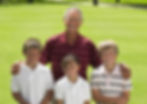Successful Aging: How to leave a legacy that’s more than financial

Q I have been thinking about the concept of legacy over the past few years and saw an article in the AARP Bulletin asking “what will your legacy be?” I’d like to hear your thoughts on the scope of what legacy might include, particularly beyond financial considerations.
— F.B.
A Dear F.B.: Legacy is what we leave behind after we exit the planet. It’s about more than money and material things, although both are important.
Legacies emanate from many sources, according to Meg Newhouse, author of “Legacies of the Heart: Living a Life that Matters” (EBookBakery Books, 2016). They come from parents, families, teachers and peers, influenced by one’s culture, religion and society.
Legacies can be expressed in various ways, according to Bart Astor from nextavenue.org in his article “4 Smart Ways to Leave a Legacy.”
• Write a family history: Children and grandchildren often have interest in understanding where you and they came from. Consider researching your family tree through genealogy and add personal notes and feelings. The story is yours, and no one else can provide it.
• Contribute to a charity: A financial contribution reflects a charitable cause that reflects your values. For those with the means, one can endow a scholarship at your alma mater; create a meaningful gift plan so your children and grandchildren receive the money while you are alive. You also might create a charitable foundation or a trust that provides ongoing distributions, which is a gift of lasting value.
• Prepare an ethical will: This type of will is not a legal document. It can be a written piece, a recording, video or a scrapbook with pictures and anecdotes. Astor writes: “An ethical will is your way of telling your personal story, tying together what you’ve accomplished, how you’ve lived your life and what you hope your heirs will take from you.”
• Write a legacy letter: This letter is a way to speak directly to those you love and say all the things you wished you had told them earlier. You can tell your granddaughter how much it meant to you to see her graduate from college or your mate why you love him (or her). You can tell your grandson the pride you felt when he hit a hole in one on the golf course at age 14. Your letter might express the joy you felt in sharing important moments with children, grandchildren, other family members and close friends.
Writing a legacy letter is easier if one has some guidelines. That’s exactly what Barbara Greenspan Shaiman has written in her book “Live Your Legacy Now!: Ten Simple Steps to Find Your Passion and Change the World” (iUniverse, 2008). Here are the three questions she suggests to get started.
• To whom will your write your legacy letter? That could be someone who has been influential in your life or family members with whom you want to share your family history and core values. It could be someone you want to inspire by your personal example or those who played a major role in your life and you want to thank them.
• What details will you include about yourself in this letter? You might include values that are most important to you, your interests or a childhood dream you pursued or are continuing to pursue. It might be what you learned from your family history or your greatest accomplishments. You might include what you appreciate or admire most about these individuals and your hopes for the future.
• What form will your legacy letter take? This might be a series of letters, a poem, a photo album, an autobiographical sketch or a combination of several of these forms.
Experts note that people on their death beds typically ask some variation of the following questions: Have I given and received love? Have I lived a life true to myself? Have I left the world a little better than I found it?
Newhouse writes these questions are too important to leave until the end of life. I agree. These questions are about living.
If we don’t like the current answers, there is time to pivot and make some changes so we can live our lives with intention and without regrets.
Thank you, F.B., for your thoughtful question. It’s one with universal appeal and importance.
Send emails to Helen Dennis at helendenn@aol.com, or go to www.facebook.com/SuccessfulAgingCommunity
